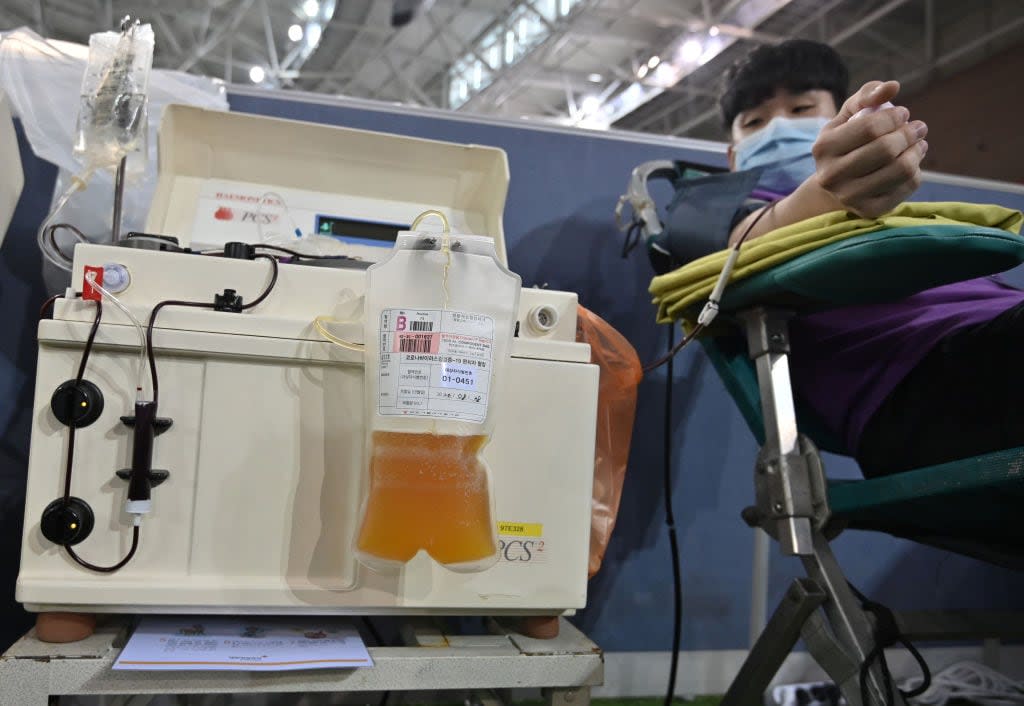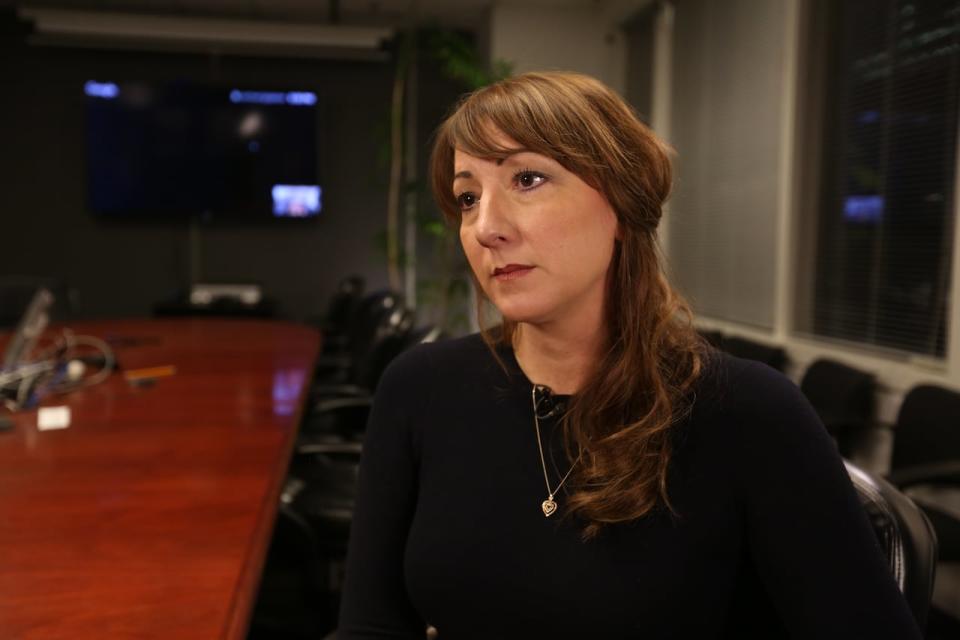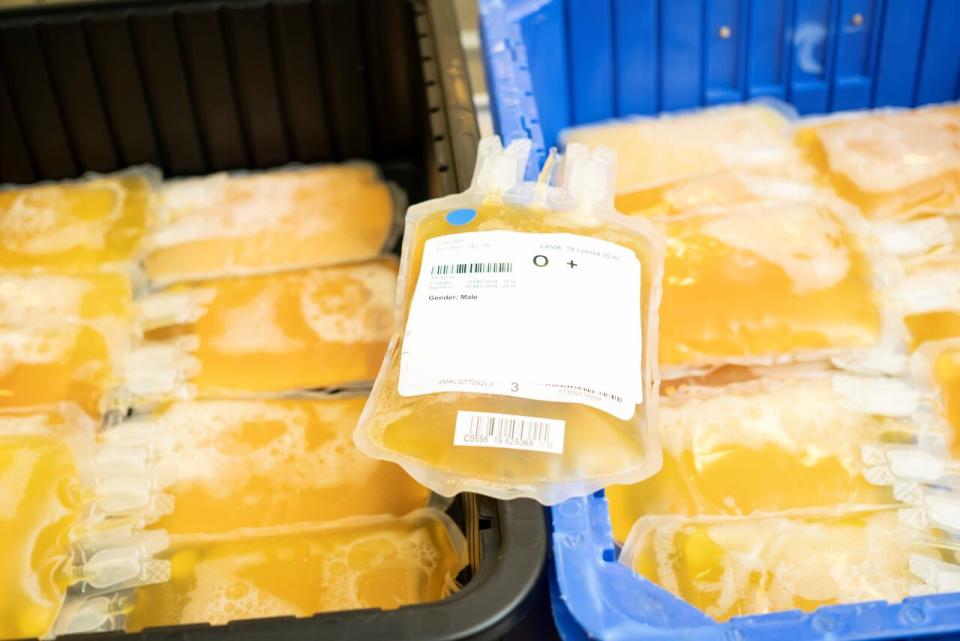Advocacy group concerned pay-for-plasma clinics expanding to Ontario will hurt voluntary donations

A group that advocates for a voluntary blood supply is concerned clinics that pay people to donate plasma are expanding to Ontario over the next year, through a partnership between Canadian Blood Services and a private Spanish company.
Three clinics in total — in Whitby, Hamilton and Cambridge — are set to open between 2024 and 2025, with two more being planned for yet-to-be-determined locations.
The plans build on a 15-year agreement signed in 2022 between Canadian Blood Services (CBS) and private pharmaceutical company Grifols to boost the national blood plasma supply.
BloodWatch, a non-profit organization that advocates for a safe and voluntary donation system, said pay-for-plasma clinics are a "dangerous field."
"We have to become more self-sufficient and there's no reason Canadian Blood Services can't open five additional plasma sites in order to collect that plasma," executive director Kat Lanteigne told CBC News.
Plasma is the yellow liquid that makes up the majority of the body's blood volume. It's rich in proteins that play a vital role in creating medications to treat many conditions, including immune deficiencies, CBS's website says.
The process for donating plasma is similar to giving blood.
In plasma donation, however, blood components are separated through a technique called apheresis, during which blood passes through a special machine that collects plasma and returns the other blood components into the donor's body.
Other provinces with private plasma clinics
The planned clinics in Ontario will be run by the Spanish company Grifols, which will pay for plasma donations "as per their operating model," Canadian Blood Services said in an email to CBC News.
"Grifols will then use that plasma to make immunoglobulins for purchase by Canadian Blood Services only. None of the immunoglobulins can be sold offshore," CBS said.
It says a global shortage of immunoglobulins (antibodies that are extracted from plasma to make life-saving medications) makes it critical for countries to increase their plasma collections.
Paid plasma clinics operating in Winnipeg and cities in Saskatchewan, Alberta and New Brunswick are run by Grifols and Canadian Plasma Resources.
In 2023, an agreement was signed that would see Grifols acquire centres run by Canadian Plasma Resources by the end of 2025.
It's not clear how much plasma donors at the Ontario clinics will be paid. The website for Canadian Plasma Resources says up to $70 is offered and people can donate twice in every seven-day period.

Kat Lanteigne of Bloodwatch, a non-profit organization that advocates for a safe and voluntary public blood system in Canada, has concerns about pay-for-plasma clinics. (Andy Hincenbergs/CBC)
Lanteigne said BloodWatch is concerned about vulnerable people selling their plasma for cash and the impact pay-for-plasma clinics may have on companies with alternative immunoglobulin therapy options.
"Competition in plasma-derived products is critical for patient access," she said. "As new products come to the market, what Canadian Blood Services has done is locked us in a 15-year contract when other products on the market could be available."
Law preventing paid blood plasma has exemption
CBS manages the country's blood supply, except in Quebec, where it's Héma-Québec's role.
Ontario, B.C. and Quebec don't allow payments to blood and plasma donors, through each province's Voluntary Blood Donations Act.
CBS is exempted from the act.
"The agreement [with Grifols] also complies with Ontario's Voluntary Blood Donations Act, which has always contained an exemption for Canadian Blood Services — with implicit consideration of our agents, given our role as the national blood operator and supplier of blood products in Canada," Canadian Blood Services said.
"Through our agreement, Grifols will operate under the act as an agent of Canadian Blood Services."
In Ontario, the act passed unanimously in the Legislature in 2014.
Alana Cattapan is Canada Research Chair in the politics of reproduction and an assistant professor in political science at the University of Waterloo
Cattapan said that at the time the exemption to CBS was under debate in the Legislature, several MPPs feared it would allow private for-profit buying of plasma and eventually violate the spirit of the act.

Blood plasma is the straw-coloured liquid component left when blood cells are removed from whole blood. It contains nutrients and immune molecules like antibodies. (Hiep Vu via Canadian Blood Services)
A spokesperson for Ontario's Ministry of Health said CBS's network of blood and plasma donor centres remains voluntary.
"Our government will continue to monitor the decisions of Canadian Blood Services to ensure it delivers a secure supply of plasma protein products to Ontarians," the spokesperson said.
Blood agency aims for better plasma goals in Canada
CBS currently relies on plasma donations to meet national demand and collects about 15 per cent of what's needed, according to its website. The remaining 85 per cent is purchased from the global market.
Peter Jaworski, a Canadian scholar, is associate professor at Georgetown University in Washington D.C. and an adjunct professor at Virginia School of Law.
He said paid clinics could help Canada become more self-sufficient.
Jaworski said the U.S. supplies 65 to 68 per cent of the plasma used to manufacture therapies globally.
"Canada has been around 80 per cent dependent on plasma collected in the U.S. since at least 2012," he said.
"We've depended on people who donate plasma in the U.S. to companies like Grifols, where they are paid for their plasma donation."
CBS said its partnership with Grifols will help them reach a target of 50 per cent in getting plasma in this country in shorter time.

